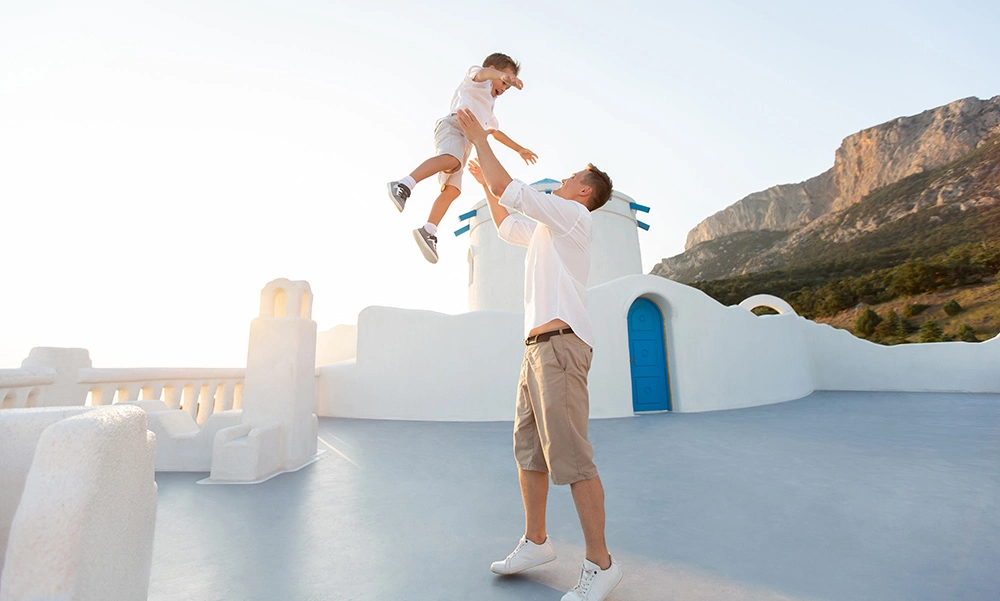Children of foreigners who have legally moved to Greece can receive free secondary education in a state school. We tell you in more detail how the Greek education system works.
Kindergartens in Greece
In Greece, family and strong family ties are very important. Grandparents play an important role, often helping to raise their grandchildren. Many Greeks do not send their children to kindergarten until they are 4 years old, as they believe that at this age the child feels more comfortable with relatives. At 4-5 years old, the child must go to the preparatory group of the kindergarten, which has recently become mandatory.
How to Enroll a Child in a Kindergarten in Greece?
In Greece, there are state kindergartens and crèches for children from 8 months. The latter are much fewer: they are not popular with the Greeks. There are crèche groups in the gardens of Thessaloniki and Athens. In small villages, there may not be a kindergarten in principle, except for a preparatory group at the school.
Both citizens and foreigners with a residence permit can apply for a place in a Greek kindergarten. However, parents can apply if they meet one of the following criteria:
- Hold a Greek Social Security Number (AMKA)
- Have been employed or self-employed in Greece within the past year
- Are officially registered as unemployed in the country
Applications for state kindergartens are being submitted on the state online portal in February. The application must be accompanied by a certificate from a pediatrician and dentist, and a vaccination certificate.
Places are distributed by competition: preference is given to single mothers or fathers, large and low-income families. Parents who did not have time to apply or did not receive a place can wait until next year or send their child to a private kindergarten. They accept children from 6 months. In large cities, the choice of private kindergartens is greater: in Athens and Thessaloniki, there are English-speaking crèches and preparatory schools.
State kindergartens do not focus on education for children under 4 years old. Children play and walk in them, but classes are mainly aimed at socialization, the ability to be in a group, and mastering everyday skills. Preparation for school begins at age 4.
- Since 2021, the Greek government has been funding a full-day program in pre-kindergarten and primary schools. It allows children to be dropped off at 8am and picked up at 5.30 pm.
- Groups for children aged 2.5 to 4 years are open from 8 am until approximately 2 pm.
- Kindergartens from employment centers for unemployed parents are open from 6.45 am to 4 pm.
- Private ones can work from 7 am to 8 pm.
In state-run short-day kindergartens, children are not provided with meals or nap time. Parents pack their own lunch boxes. Private kindergartens may include lunch and/or dinner in the price.
The cost of a private kindergarten in Greece starts from €400 per month. For a state one, parents pay from €20 per month.
Examples of Private Kindergartens in Greece
- Kiddyschool, Athens. From 6 months to 4 years. Classes are in Greek, but teachers also speak English. Opening hours: 7 am to 6 pm. Price on request.
- British Nursery School, Athens. From 1 year. English-speaking kindergarten, but the staff also speaks Greek. Price on request.
H2 School Education in Greece
From 6 to 15 years old, a child in Greece is required to attend school. For the first 9 years, all schools, except experimental ones, provide children with an education according to approximately the same program.
- Compulsory subjects from the 1st grade are mathematics, Greek, foreign language, art, and physical education.
- From grades 5-6 physics, geography, a second foreign language, and religious studies are added. Parents can refuse the latter by writing a statement to the school principal.
Orthodoxy is an important part of Greek life. Easter, Christmas and other religious holidays are public holidays. Many public schools still read morning prayers and attend services on holidays.
After the 9th grade, schoolchildren must decide whether they want to go to university.
- Those planning higher education go to lyceums (EPAL), where training lasts 3 years.
- The rest go to a technical school (ESK), where training lasts 2 years.
Lyceums are divided into general and specialized. Even in general education, students choose a specialization: economics, engineering sciences. Graduates of the lyceum take a unified exam, based on the results of which they enter a university. We tell you about the best Golden visas to educate your children here.
In technical school, schoolchildren receive a profession, for example, a welder. The training ends with a paid internship.
- From 1st to 6th grade, children study from 8.15 am to 1-2 pm, with a full-day programme until 5.30 pm. According to this program, after classes, free clubs begin right at school – robotics, dancing, music.
- High school students study from 8.15 am to 3.00-4.00 pm.
- All Greek schools have a 5-day week, only the first shift. They are closed during public holidays, Christmas, Easter and summer holidays.
- The school year begins in September and ends in June. The start and end days of holidays are set each year by the Ministry of Education.
Education in state schools is completely free. Students are provided with all textbooks and manuals. There is no uniform, except for sportswear for physical education. Parents’ expenses may include:
- €3-10 for a class excursion once a month
- Lunch boxes or money for the canteen
Children who live far from school should be provided with a free bus. If not, parents can get reimbursement for the cost.
All education in state schools is conducted in Greek. Foreigners may be offered special adaptation classes or free language classes – from 10 hours per week.
Private Schools in Greece
Most private schools in Greece teach in English, using the International Baccalaureate or British system. In Athens, there are French and German schools at the respective consulates, but it is very difficult to get into them. Places are initially distributed among the children of employees.
The cost of a private school in Greece is from €6,000 to €15,000 per year. Fees may be higher in senior classes. Additional costs include uniforms, bus fees, and excursions.
Examples of Private Schools in Greece
- ACS, Athens. Education is conducted according to American standards, in English. Children from 3 to 17-18 years old are accepted. The cost of a year of study is from €8,720 in kindergarten to €15,751 in high school.
- Pinewood, Thessaloniki. Education is conducted in English according to the International Baccalaureate (IB) program. Children from 3 to 17-18 years old are accepted. The cost of a year of study ranges from €6,850 in kindergarten to €13,750 in high school.
- Byron College, Athens. Offers a traditional British education for children aged 4 to 18. Prices range from €8,250 to €13,750.
In order to send a child to a kindergarten or school in Greece, parents need to have a residence permit. One of the most effective ways to obtain a Greek residence permit is a Golden visa. As part of the programme, it is necessary to purchase real estate worth at least €250,000. At the same time, the entire family, including the parents of both spouses, can receive a residence permit. Having lived in the country for at least 7 years and learned the language, residence permit holders and their children can apply for Greek citizenship.
You can find out all the details about all available Golden Visa programmes at a free consultation with Astons experts.




